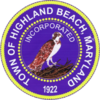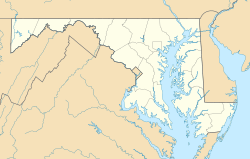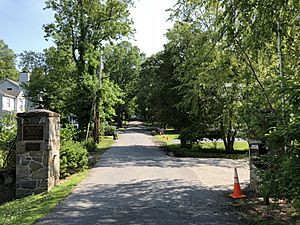Highland Beach, Maryland facts for kids
Quick facts for kids
Highland Beach
|
||
|---|---|---|
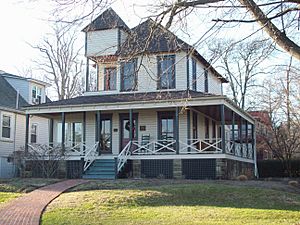
Douglass Summer House, December 2009
|
||
|
||
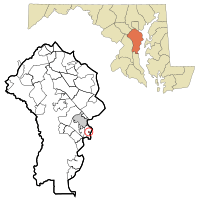
Location in Maryland
|
||
| Country | United States | |
| State | Maryland | |
| County | Anne Arundel | |
| Founded | 1893 | |
| Incorporated | 1922 | |
| Area | ||
| • Total | 0.08 sq mi (0.20 km2) | |
| • Land | 0.07 sq mi (0.18 km2) | |
| • Water | 0.01 sq mi (0.02 km2) 14.29% | |
| Elevation | 20 ft (6 m) | |
| Population
(2020)
|
||
| • Total | 118 | |
| • Density | 1,735.29/sq mi (665.58/km2) | |
| Time zone | UTC-5 (Eastern) | |
| • Summer (DST) | UTC-4 (Eastern) | |
| ZIP code |
21403
|
|
| Area code(s) | 410 | |
| FIPS code | 24-38500 | |
| GNIS feature ID | 0590467 | |
Highland Beach is a small town in Anne Arundel County, Maryland, United States. It is located right on the beautiful Chesapeake Bay. In 2020, about 118 people lived there.
This town has a special history. It was founded in the late 1800s by wealthy African Americans from Washington, D.C. and Baltimore. They were looking for a peaceful summer getaway by the water. Highland Beach was one of the first towns in Maryland to be officially run by African Americans. It even had its own police force! Famous people like historian Alex Haley, actor Bill Cosby, and tennis star Arthur Ashe have had homes here. The streets are named after important African American leaders, like Crummell, Dunbar, and Douglass.
Contents
A Special Place: Highland Beach History
Highland Beach was created in the summer of 1893. Major Charles Remond Douglass, who was the son of the famous leader Frederick Douglass, founded it with his wife, Laura. They decided to buy land here after they were turned away from a nearby restaurant because of their race. Major Douglass had served in the military during the American Civil War. He wanted to create a place where African American families could enjoy their summers without facing unfair treatment.
Major Douglass bought a large piece of land with a long beachfront on the Chesapeake Bay. He sold smaller parts of this land to his family and friends. He built two homes: one for his own family and another for his father, Frederick Douglass. Frederick Douglass's house, called "Twin Oaks," is now known as the Douglass Summer House. It was added to the National Register of Historic Places in 1992. This house became a regular meeting spot for important African Americans.
Many famous people visited or lived in Highland Beach. These included Paul Robeson, Harriet Tubman, W. E. B. Du Bois, and poets Langston Hughes and Paul Laurence Dunbar. Frederick Douglass planned to live there but passed away in 1895 before his house was finished.
In the early 1900s, the community grew. A guest house, a hotel, and tennis courts were built. The guest house was a popular place for talks and gatherings. The hotel was known for Saturday night dances and church meetings. It later became a private home.
After Charles R. Douglass passed away in 1920, his son, Haley G. Douglass, continued to develop the area. Haley Douglass helped make Highland Beach an official town on May 12, 1922. This made it the first African-American town in Maryland. He served as Mayor until his death in 1954. He and his friends kept the community small and special for many years.
Highland Beach started as a summer resort, but now people live there all year round. It is a quiet town with no businesses. Many of the homes are still owned by the families of the original settlers. The residents are very proud of their town's history. It was founded by people who wanted to overcome unfairness from their times, after the Civil War.
The story of Highland Beach is told in several books. One book is The Land Was Ours: African American Beaches from Jim Crow to the Sunbelt South by Andrew W. Kahrl. Another book, Highland Beach on the Chesapeake Bay: Maryland's First African American Incorporated Town, was written by residents Jack E. Nelson, Margo Dean Pinson, and former mayor Raymond L. Langston.
Highland Beach is located at 38°55′55″N 76°27′59″W / 38.93194°N 76.46639°W. The town has a total area of about 0.07 square miles (0.18 square kilometers). Most of this is land, and a small part is water.
Getting Around: Transportation
The main way to get to and from Highland Beach is by road. There are no major state highways that go through the town. The only road that leads into Highland Beach is Bay Highlands Drive.
Who Lives Here: Demographics
Demographics is the study of populations. It looks at things like how many people live in a place, their ages, and their backgrounds.
| Historical population | |||
|---|---|---|---|
| Census | Pop. | %± | |
| 1940 | 9 | — | |
| 1950 | 5 | −44.4% | |
| 1960 | 5 | 0.0% | |
| 1970 | 6 | 20.0% | |
| 1980 | 8 | 33.3% | |
| 1990 | 102 | 1,175.0% | |
| 2000 | 109 | 6.9% | |
| 2010 | 96 | −11.9% | |
| 2020 | 118 | 22.9% | |
| U.S. Decennial Census 2010 2020 |
|||
Population in 2020
In 2020, the town had 118 people. This was an increase from 96 people in 2010.
| Race / Ethnicity (NH = Non-Hispanic) | Pop 2010 | Pop 2020 | % 2010 | % 2020 |
|---|---|---|---|---|
| White alone (NH) | 19 | 36 | 19.79% | 30.51% |
| Black or African American alone (NH) | 68 | 75 | 70.83% | 63.56% |
| Native American or Alaska Native alone (NH) | 0 | 0 | 0.00% | 0.00% |
| Asian alone (NH) | 1 | 0 | 1.04% | 0.00% |
| Pacific Islander alone (NH) | 0 | 0 | 0.00% | 0.00% |
| Some Other Race alone (NH) | 0 | 0 | 0.00% | 0.00% |
| Mixed Race or Multi-Racial (NH) | 3 | 6 | 3.31% | 5.08% |
| Hispanic or Latino (any race) | 5 | 1 | 5.21% | 0.85% |
| Total | 96 | 118 | 100.00% | 100.00% |
Population in 2010
In 2010, there were 96 people living in Highland Beach. About 70.8% of the people were African American, and 19.8% were White. The average age in the town was about 55.7 years old. Many residents were 45 years or older.
See also
 In Spanish: Highland Beach (Maryland) para niños
In Spanish: Highland Beach (Maryland) para niños
 | Delilah Pierce |
 | Gordon Parks |
 | Augusta Savage |
 | Charles Ethan Porter |


